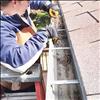Be aware of respiratory distress symptoms
Hey savvy news reader! Thanks for choosing local.
You are now reading
1 of 3 free articles.
Editor,
There have been increasing cases of Respiratory Syncitial Virus in our community, which is normal for this time of year. RSV is a viral illness that causes symptoms of the common cold as well as, rarely, Bronchiolitis (inflammation of the small airways of the lungs). Symptoms vary depending on the age and underlying health of the individual; in most children, symptoms are limited to fever, cough and runny nose. Symptoms may worsen for four to five days, and infants and children with weakened immune systems or lung disease are at risk for complications. The virus is contagious in most cases for four to eight days. Complications include bacterial pneumonia (a bacterial infection of weakened lung tissue), hypoxia (low oxygen), or dehydration (usually due to feeding difficulties in the young child). As a parent, you can offer your child fluids more frequently, treat fever with Motrin or Tylenol as directed by your healthcare provider, and monitor him or her for symptoms of respiratory distress.
Respiratory distress symptoms include blue fingers or lips, rapid breathing, refusal to nurse or take a bottle and increased respiratory rate (about one breath per second). If your child has any of these symptoms, you should take them to your health care provider immediately. Also, if your child seems to be getting better but worsens again, he or she should be seen because this may be a symptom of a secondary bacterial pneumonia. Very young children can rarely present with apnea, or not breathing, as their first symptom of RSV infection. If this occurs, call 911.
Testing for RSV is not recommended in asymptomatic children or in children with mild symptoms in whom identification of the virus will not alter treatment. Testing for RSV in adults is not often recommended. The most important infection prevention method is to keep sick children and adults out of daycare or school. RSV is spread through droplets, so a surgical mask, excellent hand washing, and decontamination of surfaces with a virucidal agent may be helpful in settings where RSV is suspected to minimize transmission.
Dr. Amanda Blea
Providence St. Joseph Medical Center
Polson















